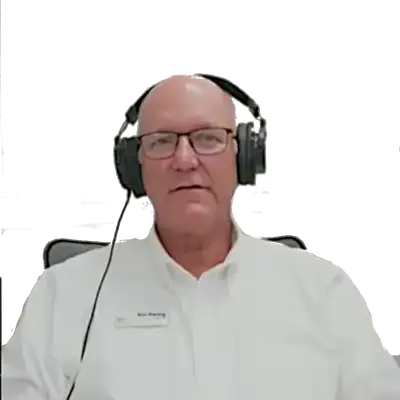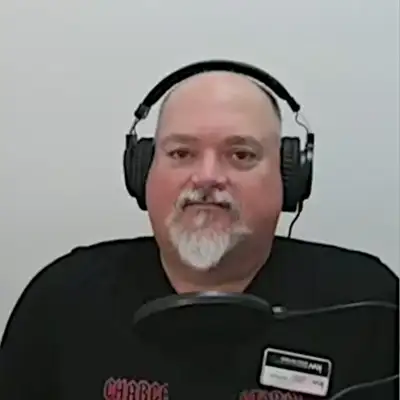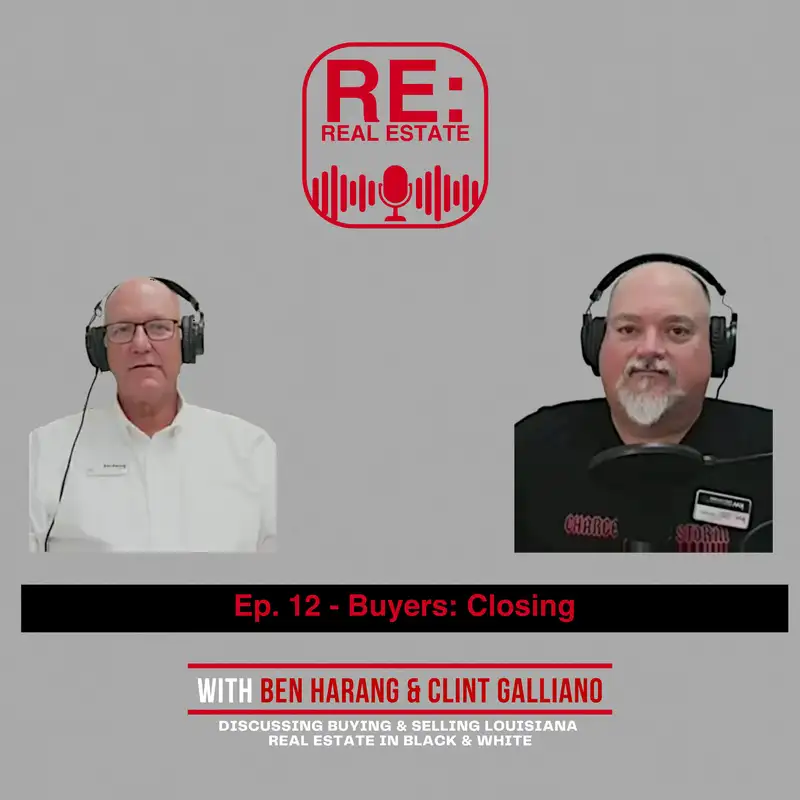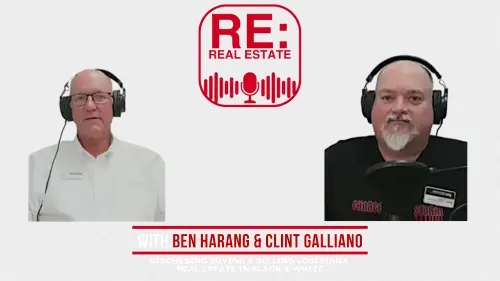Buyers: Closing Day
Ben Harang (00:21)
Clint, good afternoon. How you doing today?
Clint C. Galliano (00:24)
I'm doing wonderful, Ben. How you doing?
Ben Harang (00:26)
I'm doing terrific this afternoon, Clint. Life is good, the sun's shining, it's not too cold. We're over the freeze. So we'll start talking about the culmination of a real estate transaction in the closing.
Clint C. Galliano (00:42)
the buyer's side.
Ben Harang (00:44)
From the buyer's side. Good point. Good point. Everything we've done so far is from the buyer's side. And this should wrap it up and then we'll start on the seller's side in future podcasts.
Clint C. Galliano (00:56)
for sure.
Ben Harang (00:57)
So the,
the goal is to have a, uneventful, pleasant closing experience at the title company or title attorney's office. I've been through closings that were uneventful and I've been through closings that have been train wrecks and the uneventful closings are much more pleasant. So if, if everything's done like it should be up until
The closing, the inspections are taken care of, the response to inspections, the repairs, if any, the appraisal. If everything's done prior to, then when you get to the closing with an ink pen and a government issued ID, everything should go pretty, pretty smooth.
Clint C. Galliano (01:54)
And you don't always need the ink pen because most of the time the title companies or the closing attorneys will hand you one of those and tell you you can keep it.
Ben Harang (02:02)
Right with their name on it and it has to be in blue these days.
Clint C. Galliano (02:09)
Yeah, you know why it needs to be in blue.
Ben Harang (02:11)
Well, it used to be in, used to have to be in black because the copy, copy machines wouldn't pick up blue. And now the copy machines are so good. The original, can't tell the original from the copies anymore.
Clint C. Galliano (02:27)
right and so they make you sign it in blue to prove that it's an original.
Ben Harang (02:33)
Yeah.
Clint C. Galliano (02:34)
and that it wasn't just faxed over or something.
Ben Harang (02:38)
is just a different color.
Clint C. Galliano (02:41)
That's all right. So we also talked about, on past episodes about final walkthrough and everything. And typically we'll do that at some point before the closing, whether it's five days or the day before or the morning of, whatever it needs to be.
Ben Harang (03:03)
There you go Clint.
Clint C. Galliano (03:06)
Yep, I did it again. So we're gonna be knocking each other for saying and and especially me for saying yep. So you may hear us knocking each other for that or reminding each other that we just said something. Well, it's to help us to become better speakers and to make, there we go again.
Ben Harang (03:08)
You
Just all in good fun.
Clint C. Galliano (03:30)
to make y'all listening experience a little bit smoother instead of it just being... So anyways.
Ben Harang (03:30)
the
And you can get a sense of what it's like to do these things. Because it is just two guys sitting in front of a camera in two different locations trying to put cohesive thoughts together. We think we do a pretty good job of it, of the thoughts. Well, there you go. How we put it together is still a work in progress.
Clint C. Galliano (04:08)
We're working on it. We're not pros yet, but we're trying to get there. So the closing is the culmination of this whole process. Typically, as a buyer, you'll get the closing disclosure that tells you how much money you need to bring to closing, if any, tells you how much, again, tells you how much money.
Ben Harang (04:09)
We are.
Clint C. Galliano (04:36)
you're gonna be paying every month, tells you what you know it's gonna be, how much escrow you're gonna be paying. Darn, this is hard. This is gonna be a whole bunch of bell rings.
Ben Harang (04:41)
Ding ding ding ding.
Ding ding.
I'ma back off.
Clint C. Galliano (04:58)
So the closing disclosure lays out your costs as the buyer. And we'll also, if you're using financing, it spells out what your interest rate is, how long it'll take to pay off your mortgage, how much total interest you're going to be paying. gives you all of that. So this makes you aware of what your costs are.
going into the closing or what your finalized costs are. And you should review that to make sure everything's accurate. You should have your real estate agent look over it to make sure everything's accurate because in most cases, you as a buyer aren't quite sure of everything that's on there. So have someone else who's used to looking at them review it with you to make sure that everything is correct.
Ben Harang (05:53)
And also somebody that understands
what the agreement says and what's been agreed to. there are occasions, not often, but occasionally the title attorney or title company are hesitant to share the closing disclosure with us as your agents. And at the end of the day, you can forward it to us.
There's a form to sign early on that just releases the attorney from any liability and acknowledges that they're allowed to release the information to us so we can look at it on your behalf. Even though the purchase agreement says it, some people are still hesitant for privacy issues to share it. So it's just better to have something separate signed so at the end of the day, we don't have a problem because those
closing disclosures need to be sent out 72 hours in advance and we cannot close until that's been signed by you at least 72 hours before we close. So when they send them to you, it's not something that ought to just sit in the inbox. You ought to open it up, look at it, share it, do what you need to do to get a comfort level with it. So you can either correct it or sign it so the clock can start ticking so we can close.
Clint C. Galliano (07:22)
That's better than yep.
Ben Harang (07:23)
Yeah. Yes it is.
Yes it is. So, and really one of the other things about the closing that, that people ask about is when you buy a car, you get a title to the car in real estate in Louisiana. There is not a title to the land that you're buying. The proof of ownership is the cash sale that's recorded in the clerk of court's office for the world to see.
proves that you bought it and the previous owner sold it to you. That with the chain of, with the other sales prior to that constitutes the chain of title. And there are what are called abstractors, people that are abstractors, they go back into the title to make sure that the people you're buying the property from actually own the property, have a clear title to it.
And that title is transferred to you once the seller signs the cash sale. So that's just something that I get, a question I get asked a lot. It's not a car title that we have. It's the cash sale filed in the public records proves ownership.
Clint C. Galliano (08:42)
I've been asked that a lot, or when someone's thinking about selling, they'll say, can't find the deed to my property. We don't have that in Louisiana.
So we show up at the title company or closing attorney's office. As buyers, you bring in your form of government identification. They make a copy of it to validate that it's you. And we wait until they're ready. Some attorneys put you in a conference room right away and wait for everybody that's needed for the closing to show up.
A lot of times they'll start with the buyer first and start signing the mortgage paperwork because the seller really has no interest or bearing on the mortgage paperwork that's kind of just related to the buyer. Sometimes they wait till everybody shows up. Sometimes they keep them in separate conference rooms if there's been any kind of tension between the buyer and seller.
Generally, everybody's in the same room. Some attorneys will have you sit there, or well, some offices will have you sit there and wait until the attorney shows up before you start doing anything. so, closings at 2 and 2.30, you go into the conference room to start the closing. That's all well and good. We get everything done. Everybody's happy. You go in.
Ben Harang (10:13)
Yeah, there's usually,
usually things if, if something comes up, can generally be fixed, at, at the closing, unless a closing disclosure was not signed in time. That's one thing that, that we can't fix.
Before the meltdown of the, the real estate meltdown in 2008, 2008, we would be getting what we referred to as settlement statements at the time before closing disclosures. We wouldn't have them until we walked into the title company or title attorney's office and it'd be printing them off the printer as we were walking in and they'd be throwing them at us. So we could look at them to see if they were, if they were right.
And as time goes on, looking back on some of those sales that happened like that, when people have a clear head at two o'clock in the afternoon and not under the gun or under pressure to get it done, there were more mistakes made in those days than there should have been when things were, I'm going say fast and loose. We didn't have the 72-hour requirement for what we know today as a closing disclosure.
Which is one of the reasons why they came up with the closing disclosure. It was supposed to not be happening like it did, but the title attorneys under pressure from the lender, the buyers, the sellers, the buyer's agent, the seller's agent, everybody involved in the transaction was always pressuring everybody to get it done. Some, some people were better at getting it done under pressure than others. And some of those problems are.
of showing up today when some of that property is being sold. The problems can generally be fixed today. So it's not a huge deal. It's just another step when the abstractor goes in and looks at the title and says, well, this is wrong. was a divorce that's not acknowledged or it was separate property that's not acknowledged. Something that generally is not in all of the sales, but in some of them it gets important.
And some of those type things could have been missed. So we try not to let that happen.
Clint C. Galliano (12:39)
Yes, some of the other things that you can run across is liens on say heirs to piece of property. Typically, the lien can...
It should be cleared out ahead of time if it's a single person and that lien is on them, but say it's heirs to a property and their liens against one of the heirs. The correct way to handle it is that that person's share goes to covering that lien.
but only up to what that person stood to inherit. It does not come off the top of the proceeds of the sale. I've seen that and I didn't realize that that was the case and it came back to bite me in the butt. Because of that, luckily it wasn't a big, big, big deal, but it was something that shouldn't have happened that way.
And that was because they figured it out at the right before the closing, which is kind of idiotic. But anyways, that's a whole other discussion. Things like, you know, it's also another reason for using a reputable title company or real estate attorney and not just to go before a notary or something like that. mean,
Ben Harang (13:58)
Right.
Clint C. Galliano (14:16)
Personally for a secession I had, or not, didn't have, my mother had done on my grandparents. The attorney told her that she had to buy out her brothers on the piece of property with her portion of the cash that she received from the estate. Or at least with the, you know, part of her share of the cash that she received from the estate.
Ben Harang (14:42)
Mm-hmm.
Clint C. Galliano (14:46)
and we find out later that he also represented some of the lien holders. But we didn't find that out till five years later when we went to sell the piece of property and there were 37 liens on the property against the her brothers and then people with similar names to her brothers and so they just put it on the property because they saw a similar name and so
that all wind up getting cleared up and everything, but it was still an issue of because it was just closed through the secession attorney and not going through actual title search or anything. So those are the things that we generally help to keep you out of by recommending that you use a reputable title company and or real estate attorney. So.
Ben Harang (15:25)
Mm-hmm.
Clint C. Galliano (15:43)
All of that said, that was a long, it was a tangential sidebar, but we're back to closing. So go in, sign paperwork, sellers are there, sellers and buyers sign the act of sale. If a WDIR or wood destroying insect report, also known as a termite inspection report,
is involved then everybody signs that and then the if financing is involved the title company will verify with the lenders and sends all the paperwork they go over it with fine-tooth comb if all the i's are dotted t's are crossed they say okay that's good we're good for funding they transfer the money to the title company title company cuts checks
gives everybody checks. And then the closer gives speeches about transferring utilities and homestead exemptions if a house is involved. And everybody's happy, takes pictures. And some attorneys give speeches about.
what great advocates and wealth of knowledge the real estate agents are, and that if they have any questions to just ask your real estate agent, and also to have real estate law questions just to get back with them. And then everybody walks away happy most of the time.
Ben Harang (17:22)
Generally, it's a happy experience. What I like to do after we close from the buyer's side, we're generally downtown with the attorneys, not all the time, but most attorneys are near the courthouse. I like to walk or drive to the assessor's office with the cash sale from the closing and apply for the homestead exemption then and there.
I had one client that did not have time to do that and I would irritate them every so often about doing it five years later.
We spoke and they told me, I went pick one of them up and the assessor thankfully was able to go back four years, the current year and three previous years. Cause it's about generally in LaFouche it's about an $800 a year difference between having the homestead exemption and not having the homestead exemption. So it's not the end of the world, but it's still $800. So if you're eligible for it, you ought to get it. Don't try to get it twice. Don't try to do anything foolish, but.
If you're eligible, it's worth your time to go to the assessor's office and apply for the Homestead Exemption. It's a one-time thing and get it done. And you get that $800 discount on your property taxes every year.
Clint C. Galliano (18:48)
I haven't had anybody not do that, but then again, if the attorney doesn't say anything about it or the closer doesn't say anything about it, I give the speech and tell them where to go based on where the assessor's office is.
Ben Harang (18:59)
Yeah.
Clint C. Galliano (19:04)
and say get it done sooner than later, you know, it's like and typically the the attorney's offices are downtown. So it's a matter of taking a walk down the street or a block over to or just, you know, taking a ride a few blocks up the street and you're there and you you go in and show them the folder that you're going to get with all your paperwork and they're going to say, okay, yeah, you just bought a house. Here's a form to fill out.
Ben Harang (19:17)
Mm-hmm.
Clint C. Galliano (19:34)
and you're good to go.
Ben Harang (19:35)
Right. It's a simple form to fill out, but it's worth your time and it takes less time and effort to do it on the back of the closing than it does a month from now. So just a tidbit on how to get the homestead exemption in place for you when you buy a house.
Clint C. Galliano (20:00)
Okay, everybody's happy. I don't think so. Everybody's happy. Everybody's, you know, the sellers have their check. The buyers got their keys. They got their homestead exemption in place. They got their utilities transferred and they're going to start moving in.
Ben Harang (20:01)
Anything else Clint? Everybody's happy.
One other thing that we didn't talk about was when you mentioned keys, I tell people, the locks re-keyed or changed after you buy the house? Because the seller, I've never had a seller go back into a house after they close, but mama or daddy, a brother, sister, a friend, or cousin, somebody else has a key to the house in an emergency. Just for peace of mind.
Clint C. Galliano (20:46)
Yeah, you never know who has another key.
Ben Harang (20:51)
change the lock. have it rekeyed with the Kwikset and Schlage smart key system. Now you can rekey it to a different key in 15 seconds. So it's just something that's prudent to do. Just another thought. And with that, I'm gonna wrap it up, Clint.
Clint C. Galliano (21:08)
All right, man.
Ben Harang (21:09)
All right, you have a good one. All right, take care.
Clint C. Galliano (21:11)
You too, Ben.
Creators and Guests



